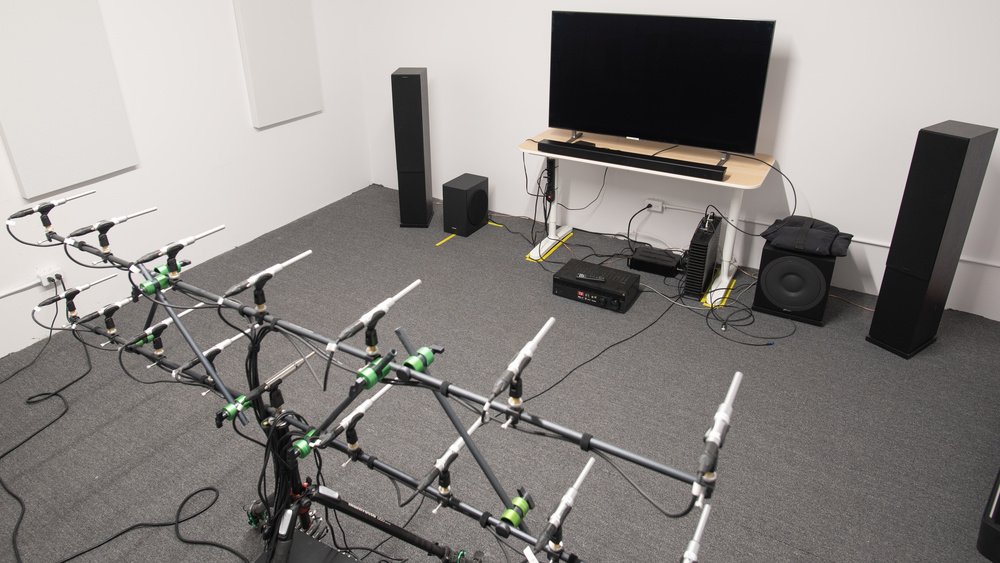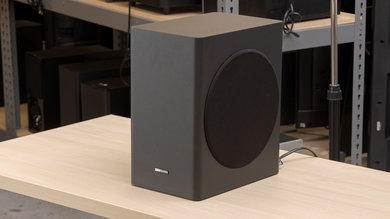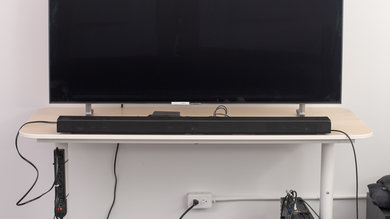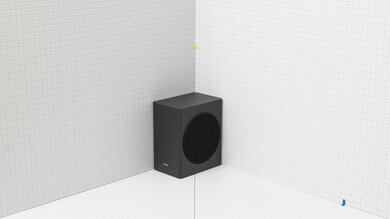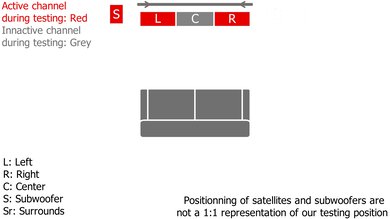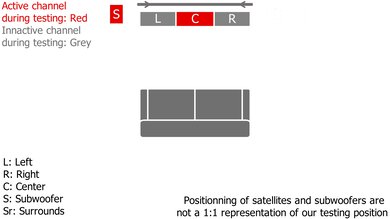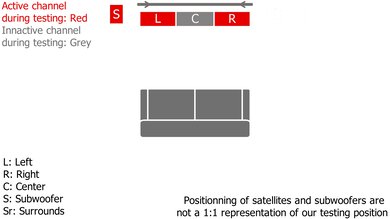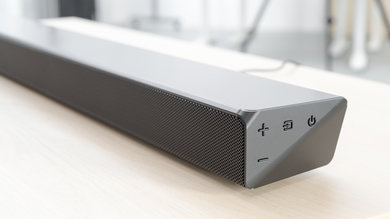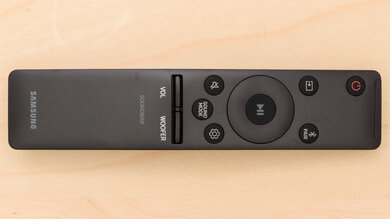The Samsung HW-R650 is a decent overall soundbar. This 3.1 system setup has a good frequency response but slightly lacks sub-bass. On the upside, due to the dedicated center channel, voices and dialogue frequencies are accurate and clear. The bar can get loud enough for most uses and performs well without too much compression at max volume. However, this bar doesn’t support Atmos and doesn’t have dedicated height channels. Nevertheless, it's a well-built bar that has an audio reproduction that should satisfy most.
Our Verdict
Decent for mixed usage. The Samsung HW-R650 soundbar will perform quite well with different types of content. Its sound profile is fairly neutral and accurate, although it does lack a bit of sub-bass, which will be noticeable in movies and bass-heavy music. It has a very good reproduction of vocals and voices, which is suitable for dialog-centered content like audiobooks and podcasts. Unfortunately, it doesn’t support Atmos and height channels for a more immersive listening experience with movies. On the upside, the bar can get pretty loud and performs well at max volume.
-
Decent stereo sound profile.
-
Well-built design.
-
Good overall performance at high volume.
-
No height channels and Atmos support.
-
No 4k passthrough.
-
Lacks sub-bass.
Good for dialogue and TV shows. The Samsung HW-R650 has a decent stereo frequency response with an accurate reproduction of voices and dialogue in movies and TV shows. It will be a good option for listening to audiobooks and podcasts too. The bar can get loud and has a Dialogue Enhancement feature. Also, it’s quite easy to stream content wirelessly to the bar via Bluetooth.
Decent for music. The Samsung HW-R650 has a pretty decent stereo frequency response, but its bass isn’t that extended, which can hurt its performance with bass-heavy genres. However, it will be suitable for most music. Unfortunately, the soundstage isn’t the widest but still is decently large. On the other hand, the bar can get loud enough for most listening scenarios and performs quite well at max volume too.
Passable for movies. The Samsung HW-R650 sounds decent but might lack a bit of sub-bass for movies. On the upside, it can get loud enough and performs quite well without too much compression at max volume. This 3.1 soundbar system will also downmix surround content to stereo and won’t offer the most immersive experience. It also doesn’t support Atmos and height channels.
- 7.3 Mixed Usage
- 8.0 Dialogue/TV Shows
- 7.4 Music
- 6.7 Movies
Changelog
- Updated Apr 06, 2021: Converted to Test Bench 1.0.
- Updated Sep 27, 2019: Review published.
Check Price
Compared To Other Soundbars
The Samsung HW-R650 is a soundbar at an affordable price point with decent performance. This 3.1 system has a great dedicated center channel for dialogue and TV shows and its stereo performance with music is decent as well. It has a dedicated subwoofer, but unfortunately has a bit of trouble with very deep frequencies, unlike higher-end soundbar systems. See our recommendations for the best soundbars, the best soundbars with subwoofer, and if you're looking for something a bit more affordable, check out our picks for the best soundbars under $300.
The Samsung HW-A650 is the upgraded version of the Samsung HW-R650. The HW-A650 is better-built. It can also reproduce a more extended low-bass. That said, both bars offer similar overall performances.
The Samsung HW-R650 is a slightly better performing soundbar than the Yamaha YAS-207, especially due to its dedicated center channel, which is great for voices and dialog. It's also a bit better-built but doesn't have the extended bass of the Yamaha. The Samsung also has more features like a dialog enhancement and night mode, on top of having a graphic EQ.
The Samsung HW-R650 and Samsung HW-R550 are practically identical, but the R650 has a dedicated center channel that the R550 doesn't have. This results in better dialog and voice reproduction, which is great when watching TV shows and movies. Other than that, these soundbars are pretty much the same.
The Samsung HW-Q60R is very similar to the Samsung HW-R650, but the Q60R has a small edge due to the fact it has the Samsung Acoustic Beam up-firing speakers that make it a 5.1 setup. They are practically the same bar with the same performance other than the fact that the up-firing speakers help the surround content performance.
The Samsung HW-Q70R is very similar to the Samsung HW-R650, but it has two up-firing speakers since it supports Atmos. Additionally, the sub of the Q70R performs better and creates more low-bass frequencies as well. However, the Q70R completely cuts off surround content instead of downmixing like the R650, which is frustrating. The Q70R also supports Wi-Fi wireless playback.
The Samsung HW-R650 is slightly better than the Sonos Playbar by itself, as we haven't tested the Sonos with a wireless sub or satellites. Both have a dedicated center channel for great dialogue performance, but the sub of the Samsung gives it a small edge when it comes to bass performance. However, the Sonos has a noticeably larger soundstage and room correction. On the other hand, it lacks inputs like HDMI ports and doesn't support Bluetooth.
The Samsung HW-R650 is a better soundbar than the LG SL6Y. Both of them are 3.1 soundbar setups that are almost the exact same size and come with a dedicated wireless subwoofer, but the Samsung has better bass response, much better center channel performance, and a fully graphic EQ. On the other hand, the LG does a slightly better job at downmixing surround content and has a larger screen.
While the Samsung HW-R650 and Yamaha YAS-209 are very similarly performing soundbars, the Yamaha is slightly better for movies and music. It has a better-balanced sound profile capable of producing more low-bass, you can stream your audio to it using Wi-Fi, and it offers a 4k @ 60 Hz passthrough. However, the Samsung also has a discrete center channel as well as bass and treble adjustment features and a graphic EQ, which is nice if you like to customize your sound.
The Samsung HW-R650 is a better 3.1 channel soundbar setup than the LG SN6Y for most people. The Samsung has a better-balanced default sound profile, more sound enhancement features, including a full graphic EQ, and better stereo dynamics. However, it can't passthrough 4k video, so the LG is a better option if you'd like to use your soundbar as a hub between your TV and 4k content sources, like a Blu-ray player or gaming console.
The 2019 Samsung HW-R650 3.1 setup is a better performing soundbar than the 2020 Samsung HW-T550 2.1 soundbar. Thanks to its dedicated center channel, the HW-T550 has a much clearer reproduction of vocals and dialogue in movies. It also has access to an app, although everything is still accessible with the remote on the HW-T550. On the other hand, the 2020 model's subwoofer seems to perform a bit better and provides a deeper thump than the HW-R650.
The Samsung HW-R650 is a slightly better performing soundbar than the Sony HT-G700. Its treble range is a bit better balanced, it has a graphic EQ so you can tweak your audio experience, and there's a USB port so you can play your favorite music from a thumb drive. Although it doesn't get as loud as the Sony, the Samsung also has less thumping and compression artifacts at max volume. However, it can't support Atmos content. The Sony, on the other hand, supports all common Full HDMI In content and eARC.
The Samsung HW-R650 and the LG SN8YG are similarly performing 3.1 soundbars. The Samsung has a less bass-heavy and more balanced sound profile than the LG and has a slightly better surround sound performance. However, the LG can support Atmos as well as eARC content and it has more sound enhancement features. You can also play music from your phone using its Chromecast built-in or via Wi-Fi. It even has Google Assistant integrated into its design so that you can use vocal commands to control your soundbar. That being said, the Samsung is a better choice if you're looking for a balanced sound straight out-of-the-box, while the LG offers more features for customization.
The Samsung HW-T650 is the 2020 version of the Samsung HW-R650, and these bars perform very similarly. Both lack a bit of sub-bass, though the HW-T650 has a slightly better performance. The HW-T650 also supports Dolby Digital Plus, unlike the HW-R650, and its stereo soundstage sounds a bit more focused. The HW-R650 has a better-sounding, less bass-heavy surround performance that may be preferred by avid movie watchers. The HW-R650 also has a dedicated companion app, which the HW-T650 lacks.
The Samsung HW-Q800A is better than the Samsung HW-R650. The HW-Q800A is a 3.1.2 setup that supports Dolby Atmos content, unlike the HW-R650. It has a better soundstage, and it can reproduce a more extended low-bass. It even has a better build quality.
Test Results
The Samsung HW-R650 is a simple bar that's mainly made of good quality plastic except for the front face that's covered with a metal grille to protect the speakers. On the right side, there are four buttons that provide some control of the system. It looks very similar to the Samsung HW-R450 overall.
The Samsung HW-R650 is almost as wide as a 55" TV and it's unlikely that it'll fit between the legs of the stand so you might have to place it front. The good news is that the bar is fairly short, so you shouldn't have issues with it obstructing part of your screen, unless your TV sits flush on the table, like the Sony A9F.
There are no satellites in this setup.
The Samsung HW-R650's stereo frequency response is decent. The Low-Frequency Extension is slightly elevated, so this soundbar won’t accurately reproduce the deep rumble and punch of bass content. On the upside, the overall sound profile is accurate and fairly neutral, with a slight tilt favoring bass frequencies, resulting in a darker sound. However, this won’t be very noticeable.
When listening to the HW-R650, the soundstage is decent. The soundstage feels to be as wide as the bar, or slightly bigger, but the bar doesn’t do anything to make it sound wider. It's also decently focused, but objects don’t seem to come from an accurate pinpoint location like some other bars, such as the Samsung HW-Q90R.
The Samsung HW-R650 can get loud enough for all types of content at max volume, which is useful in crowded environments or a very large room. There’s also barely any compression at max volume, which is great.
The amount of THD at a normal listening volume is within good limits, meaning you’ll get a pure and clean sound. However, when pushing the bar to its limits at max volume, there’s a noticeable jump in THD, which is sub-par. However, not everyone will hear this, especially with real-life content.
Due to its 3.1 configuration, the Samsung HW-R650 has a dedicated center channel, which results in a clearer and more accurate audio reproduction of dialogue in movies. The frequency response is great across the whole range but the bar doesn’t get very loud.
The Samsung HW-R650's audio reproduction when sending surround content to the soundbar is sub-par. Everything is downmixed to a stereo signal since this soundbar is a 3.1 setup. It uses the left and right speakers, which won’t do an accurate and clear representation of surround objects. This means the result won't be very immersive and the objects are perceived to come from the front instead of the sides or behind you.
The Samsung HW-R650 setup doesn’t have height channels and doesn’t support Atmos.
The Samsung HW-R650's sound enhancement features are good. It lacks a room correction, so it might sound differently depending on your room. On the upside, it has a dialogue enhancement feature to make voices and dialogue in movies clearer. Also, you have a dynamic range control which is the night mode, which can be enabled/disabled by holding down the sound mode button on the remote for a few seconds. However, this is only available with Dolby Digital tracks. You also get a 7-band EQ and a woofer adjustment level to control the amount of bass produced.
The HW-R650 has a nice set of inputs to connect with your external devices. You can connect your console or PC to the Full HDMI In and then use the HDMI ARC to connect your TV. This way the bar will give you the best overall visual and audio experience. For older devices, the 3.5mm Analog Audio In can be handy.
Over HDMI ARC you can enjoy surround sound through the Dolby Digital or the DTS formats, albeit being downmixed to 3.1. Dolby digital is very common on platforms like Netflix or Blu-rays. DTS, though, isn't common on its own but rather as the fallback of the high-quality lossless DTS-HD MA format which is widely available on Blu-Rays. Unfortunately, object-based surround formats like Dolby Atmos, which can enhance the 3-dimensional sound experience, aren't supported.
The Samsung HW-R650 downmixes surround sound to 3.1 from content encoded in Dolby Digital or DTS. Dolby Digital is widely available on streaming platforms or Blu-rays. Unfortunately, due to the lack of support for any of the uncompressed sound formats or object-based surround, like Dolby Atmos, you can't have a more immersive sound experience.
The Optical Audio In can playback surround sound formats like the very common Dolby Digital or the less common DTS. It will, however, downmix them to 3.1.
You can connect a phone or a tablet wirelessly through Bluetooth to enjoy your music but you can’t connect to Wi-Fi, or cast using Chromecast built-in or AirPlay.
Unfortunately, the HW-R650 can't passthrough 4k @ 60Hz, so your TV won't display 4k @ 60Hz video even if both your PC and TV support it. If you're looking for a 3.1 channel soundbar with 4k passthrough, consider the LG SN6Y.
The interface consists of a small screen on the front face behind the metal bar. It can display the input source and the volume level. There were no lags or bugs during our testing, but the screen is small and sometimes it has to scroll to display the entire message. For a larger interface screen, check out the LG SL6Y, although its performance might not be as good as the R650.
The remote is identical to the remote of last year's Samsung HW-N450. It looks sleek and you can control all the settings of your soundbar. When you change something, a small message on the interface screen confirms your action.
The app that pairs with this bar is the Samsung Audio Remote. It has broad functionality and you can cast files from your phone to the bar, but it's not a complete remote replacement as it's lacking the 'Settings' and 'Bluetooth' buttons.
Comments
Samsung HW-R650: Main Discussion
Let us know why you want us to review the product here, or encourage others to vote for this product.

